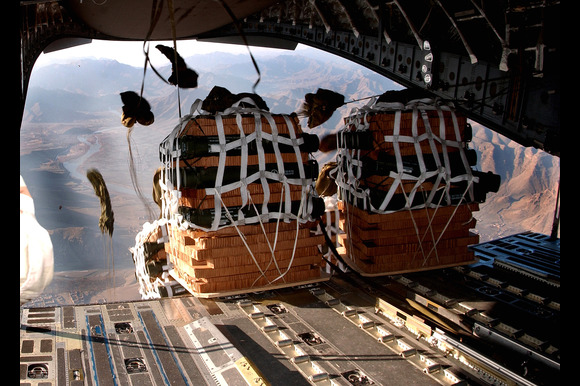UK Prime Minister Sir Keir Starmer has announced that Britain is coordinating with Jordan on plans to deliver humanitarian aid into Gaza via airdrops, as momentum grows within Parliament to formally recognise a Palestinian state. More than a third of MPs, including over half of the Labour Party’s representatives, have now signed a letter urging the government to take that step.
To support Jordan’s air operations, the UK is deploying a small team of British military planners and logistics personnel to assist in delivering aid into the besieged territory. The announcement comes as Israel confirmed it will allow foreign countries to begin air-dropping supplies in the coming days, amid escalating international concern over the humanitarian disaster unfolding in Gaza.
The Israel Defense Forces (IDF) began their own air-drop campaign on Sunday, saying it had delivered seven aid packages containing flour, sugar, and canned goods. However, humanitarian organisations and UN officials have repeatedly warned that such measures are insufficient and potentially dangerous.
Aid agencies, including the UN Relief and Works Agency (UNRWA), argue that airdrops cannot meet the level of humanitarian need in Gaza and may even endanger lives on the ground. Philippe Lazzarini, head of UNRWA, dismissed the tactic as a “distraction” that falls short of addressing the worsening starvation, stressing that road deliveries are safer and far more effective. “Airdrops will not reverse the deepening starvation. They are expensive, inefficient and can even kill starving civilians,” Lazzarini said.
Recent incidents underscore those concerns: five people died in March when a parachute failed and a package fell on them, while 12 others drowned trying to retrieve dropped supplies from the sea. Despite those dangers, the UK previously supported air operations alongside Jordan earlier in 2024, with the Royal Air Force completing 11 airdrop missions delivering more than 100 tonnes of food between March and May.
Sir Keir, writing in The Mirror, acknowledged the limitations of airdrops but said the UK would “do everything we can” to provide urgent support. “News that Israel will allow countries to airdrop aid into Gaza has come far too late – but we will do everything we can to get aid in via this route,” he said, adding that the UK is “urgently accelerating efforts” to evacuate critically ill children from Gaza to Britain for treatment.
Downing Street also confirmed ongoing cooperation with Jordan to facilitate the medical evacuation of Palestinian children. Only two young girls have been brought to the UK for private treatment so far, having arrived from Egypt in May with the help of Project Pure Hope, a healthcare initiative.
Sir Keir is expected to raise both the ceasefire efforts and broader humanitarian access in Gaza during an upcoming meeting with US President Donald Trump, scheduled to take place during the prime minister’s visit to Scotland next week. On social media, Sir Keir reaffirmed his government’s commitment to addressing the crisis: “We will pull every lever to deliver food and life-saving support to Palestinians. This humanitarian catastrophe must end.”
On Saturday, the prime minister held further talks with French President Emmanuel Macron and German Chancellor Friedrich Merz, following earlier discussions the previous night. According to a Downing Street statement, all three leaders pressed Israel to lift its restrictions on aid deliveries and backed the need for “robust plans” to transition from a temporary ceasefire to lasting peace.
The diplomatic push comes as domestic political pressure intensifies on Sir Keir to formally recognise a Palestinian state. President Macron has already announced that France will move to do so within months, and on Friday, 220 MPs from across nine parties signed a joint letter calling for immediate UK recognition of Palestine. The initiative was spearheaded by Labour MP Sarah Champion, who warned that time is running out for such action.
Speaking to BBC Radio 4’s Today programme, Champion said, “We really need to do it while there is the possibility of there being a state of Palestine… and that is not going to be there for much longer.” She also criticised the airdrop strategy as “largely symbolic,” likening scenes in Gaza to “grotesque hunger games” in which the strongest survive and the most vulnerable are left behind. “What we need is Israel to make the decision to open every single border so that aid floods in. That is the only way to stop this man-made famine,” she said.
Sir Keir has responded cautiously to the calls for recognition, stating that any such move must be part of a “wider plan” that leads to a sustainable two-state solution. Nonetheless, international pressure continues to mount. Israel’s foreign minister, Gideon Sa’ar, has condemned efforts to recognise a Palestinian state, characterising them as a “prize for terror” in the aftermath of the 7 October Hamas attacks.
Meanwhile, the humanitarian toll continues to escalate. According to the World Food Programme, nearly one in three people in Gaza are going without food for days. “Malnutrition is surging with 90,000 women and children in urgent need of treatment,” the agency warned. The UN has labelled the humanitarian situation a “man-made famine” and reiterated that easing access through land crossings is the only viable solution.
While the Israeli government maintains there is no siege and blames Hamas for the dire conditions in Gaza, the international community is increasingly united in calling for a dramatic increase in aid access and a political path to peace.






